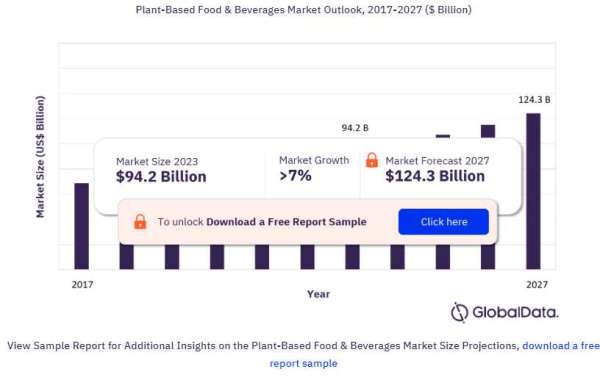The plant-based food and beverages market has witnessed significant growth in recent years, driven by the rising awareness of health benefits, environmental concerns, and ethical considerations. Plant-based diets have gained popularity among consumers seeking healthier and more sustainable food options. This article explores the current market trends, key players, growth drivers, challenges, and future prospects of the plant-based food and beverages industry.
1. The Rise of Plant-Based Diets
In recent years, there has been a significant shift in consumer preferences towards plant-based diets. People are increasingly adopting vegetarian, vegan, and flexitarian lifestyles due to various reasons, including health concerns, animal welfare, and environmental impact.
View Sample Report for Additional Insights on the Plant-Based Food Beverages Market Size Projections, download a free report sample
2. Health Benefits of Plant-Based Foods
Plant-based diets are associated with numerous health benefits. They are rich in fiber, vitamins, minerals, and antioxidants, which promote overall well-being and reduce the risk of chronic diseases such as obesity, diabetes, and cardiovascular disorders.
3. Environmental Impact and Sustainability
The plant-based food and beverages industry plays a crucial role in promoting sustainability and reducing the environmental footprint. Animal agriculture is a major contributor to greenhouse gas emissions, deforestation, and water pollution. By choosing plant-based alternatives, consumers contribute to mitigating these environmental challenges.
4. Key Players in the Plant-Based Market
The market for plant-based food and beverages is highly competitive, with both established companies and startups entering the space. Some prominent players include Beyond Meat, Impossible Foods, Nestlé, Danone, and Oatly. These companies are continuously innovating and expanding their product portfolios to meet the growing demand.
5. Market Segmentation
The plant-based food and beverages market can be segmented based on product type, distribution channel, and geography. Product types include plant-based meat substitutes, dairy alternatives, plant-based beverages, and others. The distribution channels include supermarkets/hypermarkets, specialty stores, e-commerce, and foodservice.
6. Growth Drivers
Several factors are driving the growth of the plant-based food and beverages market. Increasing consumer awareness about health and sustainability, rising disposable incomes, and changing dietary preferences are the primary growth drivers. Additionally, endorsements from celebrities, athletes, and healthcare professionals have further fueled the demand for plant-based alternatives.
7. Challenges and Opportunities
While the plant-based market shows immense potential, there are challenges that need to be addressed. High product prices, limited availability in certain regions, and taste preferences are some of the barriers to widespread adoption. However, continuous product innovation, improving taste and texture, and expanding distribution networks present significant opportunities for market growth.
8. Technological Advancements
Technological advancements in food processing and ingredient sourcing have played a crucial role in improving the quality and taste of plant-based alternatives. Innovations such as 3D printing, fermentation techniques, and the use of novel ingredients have enhanced the variety and texture of plant-based products, making them more appealing to consumers.
9. Consumer Perception and Awareness
The perception of plant-based diets has evolved positively in recent years. Consumers now associate plant-based foods with health, sustainability, and ethical considerations. Food labeling and transparent sourcing practices have helped build trust among consumers, leading to increased adoption of plant-based alternatives.
10. Regulatory Landscape
As the plant-based food and beverages market continues to grow, regulatory frameworks are evolving to ensure consumer safety and accurate labeling. Governments and regulatory bodies are developing guidelines to distinguish plant-based products from their animal-based counterparts and address concerns related to allergens and nutritional value.
11. Global Market Outlook
The global plant-based food and beverages market is projected to experience robust growth in the coming years. Increased consumer demand, expanding product portfolios, and a supportive regulatory environment are expected to drive market expansion. North America and Europe currently dominate the market, but Asia Pacific and Latin America are emerging as lucrative regions for plant-based products.
12. Regional Analysis
The plant-based food and beverages market varies by region due to cultural, dietary, and economic factors. North America and Europe have a well-established market, driven by strong consumer awareness and a wide range of product offerings. Asia Pacific, with its large vegetarian population and growing health consciousness, presents significant growth opportunities. Latin America is also witnessing a rise in demand for plant-based alternatives.
13. Emerging Trends
The plant-based food and beverages market is characterized by constant innovation and evolving consumer preferences. Some emerging trends in the industry include the development of plant-based seafood alternatives, expansion of plant-based options in the fast-food sector, and collaborations between traditional meat companies and plant-based startups.
14. Future Prospects
The future of the plant-based food and beverages market looks promising. The increasing demand for healthier and sustainable food options, coupled with advancements in technology and changing consumer preferences, will drive market growth. Continued investment in research and development, collaborations, and marketing initiatives will be key to unlocking the full potential of the industry.
Conclusion
The plant-based food and beverages market is experiencing rapid growth, driven by factors such as health consciousness, environmental concerns, and changing consumer preferences. As more people embrace plant-based diets, the market is witnessing a surge in innovative products and expanding distribution networks. With ongoing advancements in technology and increasing consumer awareness, the plant-based industry is poised for a bright future.








